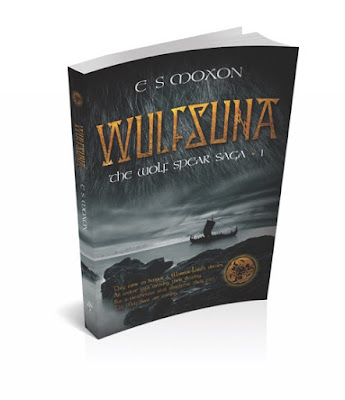When writing historical fiction it is hard to escape the facts in history. Whole novels are penned on factual historical characters or factual events such as well-known battles. What I find personally enjoyable is when you can take a small fact and weave it into your fictional setting. I did this with my first novel 'WULFSUNA', where I used the name of a documented Saxon tribe of the 'Hwicce' as the basis of a fictional Romano-British settlement within the Welsh borders.
Historical documentation for the tribe of the Hwicce, which covered what is now parts of Gloucestershire, Herefordshire and Worcestershire, does not give much information prior to the 7th Century. Even the name has caused some contention that divides historians. There are some who believe the 'cc' to be pronounced hard like a 'k' while others continue to lean toward it being soft as the Italian 'cc' in cappuccino. For 'WULFSUNA' I chose an anglicised spelling that, at the time, best resembled the commonly held version of correct pronunciation (the soft sound). I added an 's' to the end and hence the 'Hwychas' of Prenhwychas were born.
The real Hwicce eventually became the most important shire of Mercia, the beginning of the powerful kingdom of the Midlands ruled by Penda. It is suggested this sub-kingdom was itself fully functional as a kingdom in its own right prior to its immersion into Mercia; an ecclesiastical centre run by a small Anglian warrior elite. (It is rumoured King Offa grew up among the Hwicce.) In the AD770s sub-kings were replaced with mere Ealdormen and the kingdom of the Hwicce was absorbed by Mercia, although it continued to thrive and in the 11th Century was said to have a 'tribal hidage' of 7,000 hides.
Reading parts of the Historia Brittonum for research, there is mention of the Hwicce tribe originally being a native Brytonic settlement, which later came under the rule of an unknown Angle - a shadowy figure with no name. The document ascribes to Germanic settlers in Deira prior to AD500 and then of course, there are the Foederati and disparate Germanic mercenaries left over by the Roman Empire's withdrawal from Britain in the early to mid 5th Century. This premise seemed to perfectly match my fictional Angle tribe of 'tha Eforas' (the Boars), the formidable enemies of the Wulfsuna. An idea began to form, as historical fiction played with historical fact. Here was a hint of realism that could be interwoven with my fiction.
Could my fictional settlement of Prenhwychas come under the rule of one of 'tha Eforas'? Could this Angle warrior allude to be the shadowy figure mentioned in the Historia Brittonum? If so, perhaps he would change the name of the settlement more fitting with his native tongue and I could use the alternative pronunciation with the hard 'k' to show this in my second Wolf Spear Saga. After all, Prenhwychas has a majority Christian population and is swift becoming surrounded by settling Germanic pagan tribes; mercenaries abandoned and unpaid by Rome and hungry for payment or retribution. Accepting Anglian rule would keep them safe, as this new leader would know the language and tactics of these so-called barbarian neighbours.
Well, to find out whether or not this transpires you shall have to wait until Wolf Spear Saga 2 is published, so I shall leave that speculation hanging! What I will say is that these fortuitous unions of facts and fiction help to bring readers deeper into your stories, tempting them with morsels of truth. We can only wonder at the reality behind the birth of the tribe of the Hwicce and how it became a sub-kingdom of a dynasty, ruled by Saxon Ealdormen several centuries later. Even if this is conjecture by early historians with no basis in fact, I love my Hwychas tribe and their fortified hilltop settlement with ramshackle Roman villa, honey-coloured stone walls and long-horned sheep. A former 'municipium' of Rome and thriving crofter community, where each roundhouse has its own field to cultivate, it has weathered civil unrest and betrayal by its magistrates. It is as real to me as any historical fact and hopefully is as real to my readers.
Writing as ‘E S Moxon’, Elaine's debut historical fiction adventure ‘WULFSUNA’ was published January 21st, 2015 and is the first in her Wolf Spear Saga series. She is currently writing her second novel, set once again in the Dark Ages of 5th Century Britain, where the legendary Saga ensures a Seer and one named 'Wolf Spear' are destined to meet. You can find out more about Elaine’s novels on her website or follow her on Twitter or Facebook.
Elaine lives in the Midlands with her family and their chocolate Labrador.
~ ~ ~
Blood, betrayal and brotherhood.
An ancient saga is weaving their destiny.
A treacherous rival threatens their fate.
A Seer's magic may be all that can save them.





I loved reading this. Your research is fascinating (& impressive.) I agree 100%. As writers of fiction we have the freedom to 'make stuff up' - when we can merge fact & fiction it's truly rewarding. I deal in myths & fairy-tales; arranging the old around a contemporary setting. Different & yet I think there's a similar basic structure & thought-process involved. We're both looking for ways to weave two things into one. xXx
ReplyDelete